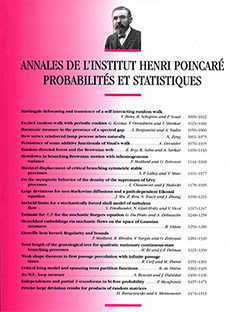Abstract
We consider the parabolic Anderson problem with random potentials having inverse-square singularities around the points of a standard Poisson point process in $\mathbb{R}^{d}$, $d\ge 3$. The potentials we consider are obtained via superposition of translations over the points of the Poisson point process of a kernel $\mathfrak{K}$ behaving as $\mathfrak{K}(x)\approx \theta |x|^{-2}$ near the origin, where $\theta \in (0,(d-2)^{2}/16]$. In order to make sense of the corresponding path integrals, we require the potential to be either attenuated (meaning that $\mathfrak{K}$ is integrable at infinity) or, when $d=3$, renormalized, as introduced by Chen and Kulik in (Ann. Inst. Henri Poincaré Probab. Stat. 48 (2012) 631–660). Our main results include existence and large-time asymptotics of non-negative solutions via Feynman–Kac representation. In particular, we settle for the renormalized potential in $d=3$ the existence problem with critical parameter $\theta =1/16$, left open by Chen and Rosinski in (Chen and Rosinski (2011)).
Nous considérons le problème parabolique d’Anderson avec potentiels aléatoires ayant des singularités en carré inverse autour des points d’un processus de Poisson standard dans $\mathbb{R}^{d}$, $d\ge 3$. Les potentiels sont obtenus par superposition de translations par les points du processus de Poisson d’un noyau $\mathfrak{K}$ satisfaisant $\mathfrak{K}(x)\approx \theta |x|^{-2}$ près de l’origine, où $\theta \in (0,(d-2)^{2}/16]$. Afin de pouvoir définir les intégrales de chemin correspondantes, nous demandons que le noyau soit ou bien atténué (intégrable à l’infini), ou, en $d=3$, renormalisé au sens de Chen et Kulik (Ann. Inst. Henri Poincaré Probab. Stat. 48 (2012) 631–660). Nous montrons l’existence et le comportement en temps long des solutions positives par représentation de Feynman–Kac, en particulier dans le cas critique $\theta =1/16$ laissé ouvert par Chen et Rosinski (Chen et Rosinski (2011)).
Citation
Peter Nelson. Renato Soares dos Santos. "Brownian motion in attenuated or renormalized inverse-square Poisson potential." Ann. Inst. H. Poincaré Probab. Statist. 56 (1) 1 - 35, February 2020. https://doi.org/10.1214/18-AIHP953
Information





